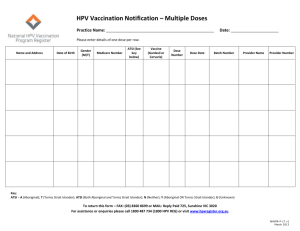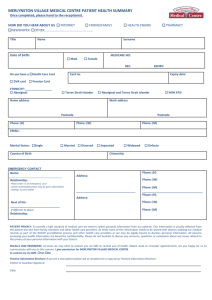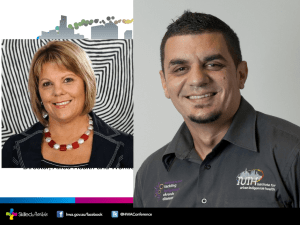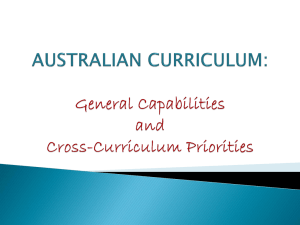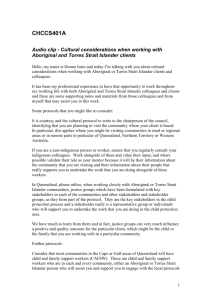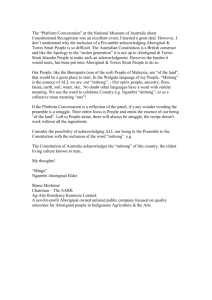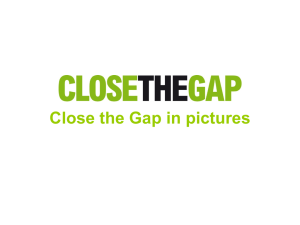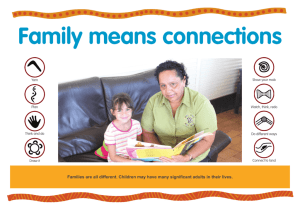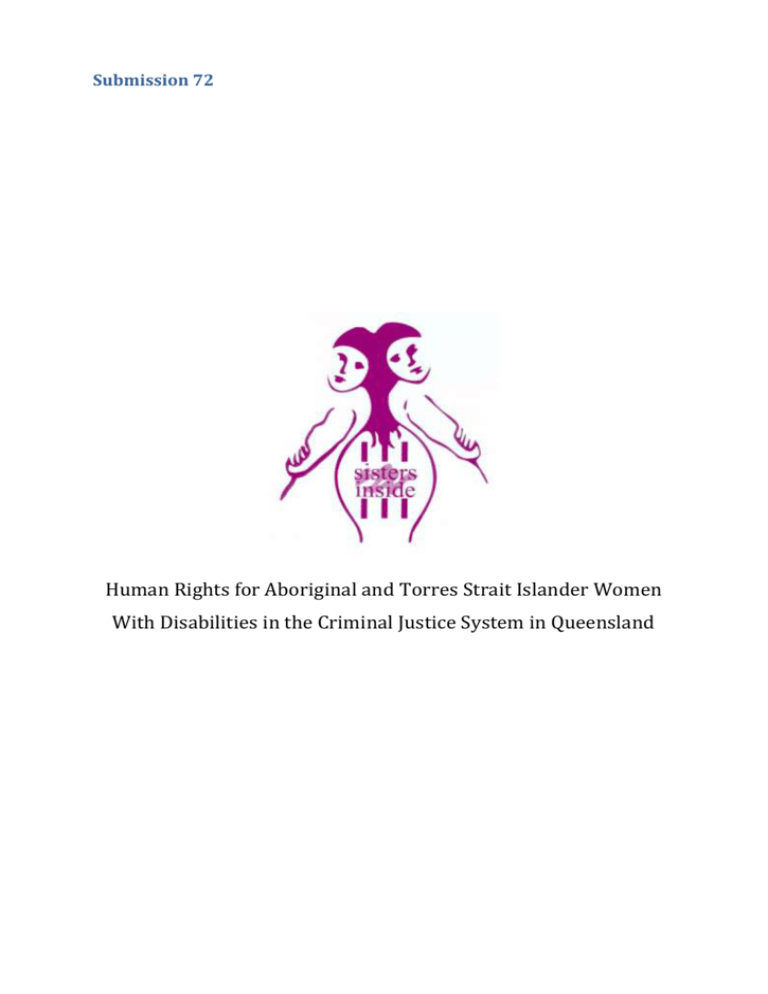
Submission 72
Human Rights for Aboriginal and Torres Strait Islander Women
With Disabilities in the Criminal Justice System in Queensland
Submission 72
© Sisters Inside Inc 2013
This document is copyright. All rights reserved. Apart from any fair dealing for the purposes of private study, research,
criticism or review, as permitted under the Copyright Act, no part of this publication may be reproduced, stored in or
introduced into a retrieval system, or transmitted in any form or by any means without written permission. Inquiries
should be made to the Copyright holder and the publisher.
Submission 72
Published by:
Debbie Kilroy, CEO
Sisters Inside Inc
PO Box 3407
South Brisbane Q 4101
Phone (07) 3844 5066
Fax (07) 3844 2788
Email admin@sistersinside.com.au
About Sisters Inside
Human Rights for Aboriginal and Torres Strait Islander Women
With Disabilities in the Criminal Justice System in Queensland
Who is Sisters Inside Inc?
Established in 1992, Sisters Inside Inc. (SIS) exists to advocate for the human rights of women in
the criminal justice system and to address gaps in the services available to these women. We
work alongside women in prison to determine the best way to fulfill these roles.
SIS works closely with prisoner and human rights advocacy organisations in Australia and more
widely. Nationally, we have a substantial track record for evidence-based advocacy for the
rights of women prisoners and other women in State and Federal criminal justice systems.
Internationally, SIS has NGO Consultative Status at the United Nations and plays a key role in
advocating for international standards to ensure that treatment of women within criminal
justice systems is congruent with agreed international human rights standards.
At a service delivery level, SIS uses empowering, rights-based approaches to support
criminalised women in prison, and following release from prison, throughout Queensland. We
also work with young women in the juvenile justice system and the children of criminalised
women.
1. What are the biggest barriers for you or other people with disability in the criminal
justice system?
Submission 72
Incarcerated women with disabilities, especially Aboriginal and Torres Strait Islander women
from rural and remote areas of Queensland, experience significant barriers to justice at every
stage of the criminal justice system. This population of women prisoners is poorer, worse
housed, sicker, more vulnerable to violence and exploitation, and less literate, than almost any
other group of Australians. Such women – as well as many other women with disabilities –
experience discrimination and institutionalised abuse and neglect in almost every area of their
lives. These experiences of discrimination include but are not limited to medical systems,
educational systems, and the criminal justice system, a situation which sets such women up to
exist within a ‘revolving door’ of prison experiences.
Aboriginal and Torres Strait Islander women living in rural and remote areas of Queensland are
also far more likely than other Queenslanders to experience ABI (acquired brain injury) and/or
mental illness and/or other forms of disability. The degrees of domestic violence and sexual
assault experienced in rural and remote Aboriginal communities are an intrinsic part of the
underlying disability rates of this group. Dr Howard Bath, the Northern Territory Children’s
Commissioner, has been quoted saying that Aboriginal women in remote areas of the Northern
Territory are 80 times more likely than white women to be hospitalised from violence: C.
Sutton, “Violence Against Aboriginal Women 80 Times Worse”( news.com.au June 10, 2013).
Indigenous women in North Queensland lead lives very similar in many respects to NT
Aboriginal women and a similar exposure to violence can be assumed in many rural and remote
Queensland areas.
This situation of exposure to extreme violence from birth can and does lead to very high levels
of ABI and/or mental illness in these women. The most common cause of ABI in Australian
women is being throttled, and thereby denied oxygen to the brain, a very common occurrence in
domestic violence. Physical blows to the head and the abuse of solvents (eg sniffing petrol or
paint) are two other extremely common avenues to ABI in both Indigenous and wider
populations, though once again Sisters Inside believes that Aboriginal populations are greatly
over-represented. These experiences, leading to ABI, then very often result in a range of unmet
needs and challenging behaviours by Aboriginal and Torres Strait Islander women. Prison is the
likely outcome of ABI and other forms of disability for a large number of rural and remote
Indigenous women.
“Look at the geography of Queensland. Intellectual disability isn’t confined to
those who live in the south-east corner.”
Submission 72
Bill Carter, retired Supreme Court Judge, Queensland, All in the
Mind, ABC Radio National, April 17 2011.
Underlying conditions of poverty, discrimination and unmet need set women up for lives where
they are extremely marginalised from the mainstream economy and society. They are therefore
far more likely to live and socialise in places and communities where they experience overpolicing, such as public parks and streets, and to be arrested and incarcerated for behaviours
commonly overlooked or explained away for others in Queensland. Women who have been
molested and/or raped and/or bashed through domestic and family violence are also much
more likely to present with personality disorder, depressive illnesses and psychosis. All such
conditions predispose Aboriginal and Torres Strait Islander women from rural and remote
areas to becoming criminalised at far higher rates than other women in Queensland. When
these women are criminalised their ability to speak on their own behalf and be understood is
often very limited due to communication problems, lack of standard English, or both.
Critically, Indigenous women from rural and remote areas of Queensland are very likely to be
arrested and incarcerated and never know what they are locked up for. The deadly combination
of ABI, mental illness, and aboriginality means that these women often have minimal if any
understanding of what the criminal justice system is doing with them. It is quite common for
Sisters Inside to meet and work with Aboriginal women in the Townsville Correctional Centre
who have no idea what they were charged with or convicted for. All they know is that they are
locked up - again.
Psychiatric disability has been estimated at 80% of the Australian prison population (Whiteford
and White, EMJA, 2006). Therefore about (Sisters Inside would argue ‘at least’) four in five
prisoners in Queensland are entering a system very poorly equipped to deal with, let alone
successfully treat, their disabilities. Prisoners upon arrest are likely to be deprived of their
ordinary medications, which may be locked away with their other possessions until they are
released days, weeks, months or years later. There is no guarantee that prisoners will be seen
by a mental health professional or even by a GP. There is no guarantee that prisoners with a
mental illness and/or ABI will receive any suitable medication within the criminal justice
system. Incarcerated women may receive the wrong or unsuitable medication. They are often
subject to punishment if they refuse to take this medication, even if they know they are allergic
to it or have other adverse physical or psychological reactions from it. Many women serve their
prison sentence in a state of great distress, un-medicated and untreated for severe mental
illness which is the main reason they are imprisoned in the first place. Aboriginal and Torres
Submission 72
Strait Islander women may not speak standard English or indeed any English in some cases.
These women are profoundly disadvantaged within a criminal justice system which
automatically regards them as able in body and mind, and thus not requiring any special
measures. Their background of poverty and violence, coupled with a criminal justice system
which fails to understand their experience, denies them appropriate treatment and very often
fails to provide access to medications as well, ensures a ‘revolving door’ experience of the prison
system.
Second, institutional racism means that Aboriginal people with disability, especially those who
are homeless and/or living in rural and remote areas, can find it very difficult to access
disability services in the community, in the rare cases where such services even exist. Nonindigenous staff often have difficulty in understanding the Aboriginal languages or Aboriginal
English of people with disabilities in such situations. They are also far less likely to know of
culturally valid ways to interact with and treat Aboriginal clients with disabilities. They may
interpret behaviours as ‘cultural’ when in fact these behaviours are manifestations of either
distress, or of disabilities such as personality disorder, depression, and/or ABI. This can lead to
frustration and anger on the part of the women concerned, and speeds their ‘progress’ towards
further incarceration. Prison thus becomes an inevitable and default option for women who
should, and in a civilised society would, be offered appropriate mental health support to live in
their own communities.
The biggest barrier to justice for Aboriginal and Torres Strait Islander women in rural and
remote Queensland, therefore, is the underlying situation of poverty and exclusion which forms
the bedrock of their lives. However, systemic failures by the criminal justice system to
recognise when Indigenous women are suffering from ABI and/or mental illness, rather than
exhibiting ‘simple’ criminal behaviour, is also a key ongoing and serious concern. The particular
needs of this group of disabled and disadvantaged women are not recognised, let alone
addressed, and this is a huge barrier to justice. The problems of ABI and mental illness in
rural and remote Aboriginal prisoner populations must be recognised before they can be
addressed.
2.
What could be done to remove these barriers and help people with disability in the
criminal justice system?
Submission 72
a. People with disabilities do not belong in the criminal justice system. Prison, which is an
entirely unsuitable environment for any woman let alone women with disabilities, has
become a default option for the existing legal process, a process which is badly failing
disabled Australians. Disabled people, especially Indigenous women who make up a
large number of incarcerated women with disabilities, need, and should be provided
with, the adequate support that is their human right. Such support would enable these
women to lead healthy and fulfilling lives without being automatically funnelled into
prison because of their disabilities. With appropriate housing, health care and other
support structures in place, people with disabilities would not be nearly as at risk of
being incarcerated through no fault of their own. Breaches of human rights would be
lessened and human dignity immeasurably increased. Other social and economic
benefits would then flow from this common sense and humane approach.
b. Funding should immediately be provided to a range of services which provide targeted,
culturally valid support, to women (and men, and youth) with disability entering the
criminal justice system. (Given that 80% of the prison population has been estimated to
have a mental illness of some kind, this means the vast bulk of women entering the
prison system, especially Aboriginal and Torres Strait Islander women from rural and
remote areas). Organisations such as Sisters Inside work with incarcerated and
criminalised women in ways which seek to recognise their human rights. Sisters Inside
also works to maximise these disabled women’s understanding of the criminal justice
system they have become entangled in. As the majority of clients of Sisters Inside suffer
from either an affective disorder, addiction issue, personality disorder, PTSD or ABI, (or
frequently combinations of these) the organisation is well placed to provide skilled and
effective interventions with this group of women with complex disabilities.
Funding for Sisters Inside workers and other relevant support organisations, especially
in North Queensland, is critical to ensuring that Aboriginal and Torres Strait Islander
women with complex disabilities are properly supported before, during and after
incarceration. These women are very often caught in a revolving door of ABI/psychiatric
disability which sends them to prison over and over again, often for petty street crimes
and often for no good reason at all. Prison is the default option for rural and remote
Indigenous women who would be better seen as needing health and legal interventions,
not imprisonment. These women require highly skilled and motivated interventions
from workers whom they trust and have built relationships with. Sisters Inside can offer
these kinds of workers, but funding is extremely limited and Sisters Inside is currently
Submission 72
unable to provide more than a bare minimum of ‘bandaid’ support to these very
marginalised and disempowered disabled women when they are incarcerated in the
Townsville prison, for example.
c. Training in the specific complex needs, especially of Aboriginal and Torres Strait
Islander women with ABI and/or mental illness or other disabilities, must be
undertaken with staff of medical services, legal services, police, prisons, and the courts.
The practice of criminalising women for distress behaviours that stem from disability is
a gross affront to these women’s human rights. In particular, the communication needs
of disabled Aboriginal and Torres Strait Islander women who have limited or no
standard English must be addressed, and steps taken to ensure that interpreters are
provided when these women are arrested, being questioned, and when they are being
offered medical treatment.
d. The practice of routinely denying disabled women in prison both their medication, and
access to reasonable medical care, must cease immediately. Women with disabilities –
again, this is the vast majority of women in prison, given that 80% of prisoners have a
mental illness – should be consulted as to their medication history and needs, and be
given timely and reasonable access to both physical and mental health care as required.
To deny women their ordinary medications while in a situation of huge stress while
incarcerated is nothing other than torture. This cruel treatment serves no purpose
whatsoever and can only lead to further expense, trauma and incarceration of the
women in question.
3.
Can you provide information about support that has helped you or other people with
disability to participate in the criminal justice system?
Sisters Inside has worked with incarcerated women with disabilities for a period of twenty
years. Workers at Sisters Inside receive ongoing training and support to recognise and
respond appropriately to criminalised women with ABI/PTSD, other mental illnesses, and
personality disorders. As a result Sisters Inside has, on a weekly basis, been able to offer
human rights advocacy; financial and other counselling; sexual assault support, and housing
and social support to any woman in the Queensland criminal justice system. This as a matter
of course includes work with women with disabilities in the Brisbane Women’s Correctional
Centre, the Numinbah Women’s Correctional Centre, and the Helena Jones Community
Submission 72
Corrections Centre. Sisters Inisde also periodically works with women in the Townsville
Correctional Centre, and conducts ongoing work with many, many women who have recently
been released, or are on probation and parole.
Because Sisters Inside works within a human rights framework which aims to support
women with disabilities to make their own decisions, we believe that our work has great
long term benefit. The fact that an incarcerated woman has a personality disorder, is not able
to communicate in standard English, or may be suffering from schizophrenia or bipolar
disorder, or other disability, does not mean that she should not be given the same access to
legal, health, housing and social support as any other woman.
A non-Aboriginal woman was being transported from the Brisbane Women’s
Correctional Facility to attend court in Toowoomba. She suffers from a number of
physical disabilities. The woman was placed in a canopied ute unrestrained, and
during the trip she was flung about in this confined area, unable to stabilise herself
due to her disabilities. She consequently vomited, and had to travel dirtied by her
vomit. On arrival she was, despite being soiled and in distress, made to clean the ute
out. Sisters Inside advocated for this woman and took her complaints to the CMC.
Unfortunately the CMC found that ‘reasonable force’ had been applied in this
instance.
In the experience of Sisters Inside the vast majority of criminalised women with disabilities are
able to lead healthy, fulfilling lives in which they contribute to the community, with some
appropriate support from skilled organisations. Such women do not need decisions made for
them; they need to be supported to find appropriate services and strategies that will help them
implement their own life decisions. They also, of course, require access to appropriate medical
treatment and medication whilst incarcerated; this is unfortunately the exception rather than
the rule.
4.
Please tell us about any time that you or another person with disability experienced
barriers to justice.
Dr Paul White and Professor Harvey Whiteford have argued that 80% of Australians held in
prison have a mental illness of some kind. It has also been estimated that 30% of people
coming in contact with the law have an intellectual disability (Low IQ and in Jail,
Submission 72
Background Briefing, ABC Radio National, April 17, 2011, retrieved August 7, 2013). The
Acquired Brain Injury organisation Synapse has advised Sisters Inside that approximately
80% of prisoners in Queensland are estimated to have ABI (personal communication;
August 6, 2013).
With statistics of this kind, clearly most experience within the criminal justice system
designed for healthy, average, populations is going to involve potential injustice. To take
one narrow range of examples, women in prison in Queensland frequently enter prison on
one kind of medication. But even where women entering prison are able to provide a letter
from a GP saying that they need to be on a particular medication, it is common practice for
the prison system to deny them that medication. If it is not on the state purchasing plan,
another drug – or potentially no drug at all – could be substituted. If another drug is
substituted, the incarcerated woman is then absolutely required to take the new drug or be
subject to a disciplinary ‘breach’.
If the woman is aware that she has a physical or psychological reaction to the new drug and
refuses to take it she is likely to be breached and put in isolated detention from other
prisoners. She will have no mattress in her cell during the day. Her only avenue for exercise
is in a concrete yard two hours per day. She will be handcuffed coming or going from the
special detention unit (DU). She can be held in the DU for 28 days before her case is
reviewed. One woman was put in the Brisbane Women’s Correctional Centre DU for
purchasing a soft drink from the wrong vending machine, which was considered out of
bounds. Women can be incarcerated in the DU for walking on the grass rather than
following a concrete path (this is considered an attempt at escape).
Once incarcerated in the DU for refusing to take unsuitable medication, a crying woman will
often be considered suicidal and she will then be put in a suicide gown. This is a canvas
gown with an open back, often with no underwear, tied at the neck. The woman will be
given no sanitary products, no hot food and no cutlery. She will be given only water to
drink, and will be fed cold meals through a hole in the door. All this treatment can, and
frequently does, stem from an incarcerated woman refusing to take medication which she
knows is unsuitable for her mental illness or other disabling condition. This routine practise
of isolation and punishment can only be regarded as torture, especially for Aboriginal and
Torres Strait Islander women from rural and remote areas.
Submission 72
5. Do you have any other thoughts, ideas or comments you would like to make about
people with disability and the criminal justice system?
Jail is not the right place for these people! People with disabilities have special needs and in
particular so do Aboriginal and Torres Strait Islander people. Aboriginal and Torres Strait
Islander women from rural and remote parts of Queensland have specific cultural, medical and
other needs which are being failed on a daily basis by the criminal justice system. The human
rights of these women with disability are routinely abused by their incarceration in a system
which not only fails to meet their needs, but fails to even recognise that they exist. We can do
better, and unless we do, the human rights of disabled women in prison will continue to be
abused. This is not only a shameful state of affairs, but one with huge social, emotional and
financial costs for our society. Community based alternatives to imprisonment can and
must be found.

